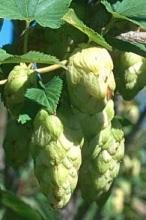
Humulus lupulus
This vine is the only other known member of the Hemp family, the Cannabinaceae. It produces a sticky and bitter resin on its female flowers, which contains most of the active principles of the plant. It dies back to the ground every fall, sending new and vigorous shoots out early in the spring. It can grow quite tall before it sets its flowers, or strobiles, which we harvest in the early fall for drying. This herb loves rich and well-dug soil, and thrives in a sunny exposure with plenty of room to climb.
Elemental associations: Air
Phytochemistry: Bitter acids, flavonoids, phenolic compounds, resins, tannins
Actions: Sedative, nervine
Specific systems: Nervous, reproductive (somewhat)
Many people, for a variety of reasons, do not do well with Valerian when attempting to address their insomnia. Hops is often the better alternative! It is gently sedating, allowing rest within an hour or so for the overactive mind, and doesn’t leave a ‘hangover effect’.
Alongside other supportive nervines, low doses of Hops can have a beneficial effect on daytime anxiety. Just be sure to regulate the dose appropriately…
In cases of ‘overactive’ libido, especially in men, the same low-dose treatment can be very helpful.
Indications: Insomnia, anxiety, overactive libido
Contraindications: None really – the fresh plant can cause allergic reactions on over-exposure
Preparation/Dosage: Tincture of the dried strobiles, 70% alcohol, 1:5 to 1:10. Take ½ teaspoon 45 min. before bedtime for insomnia; take ¼ teaspoon twice daily for anxiety. Alternatively, since the tea is very difficult to take, Hops can be administered as a standard low-alcohol fermented preparation (usually with barley): a good-quality microbrewed beer before bed can be quite helpful. Be careful of habit-forming issues
